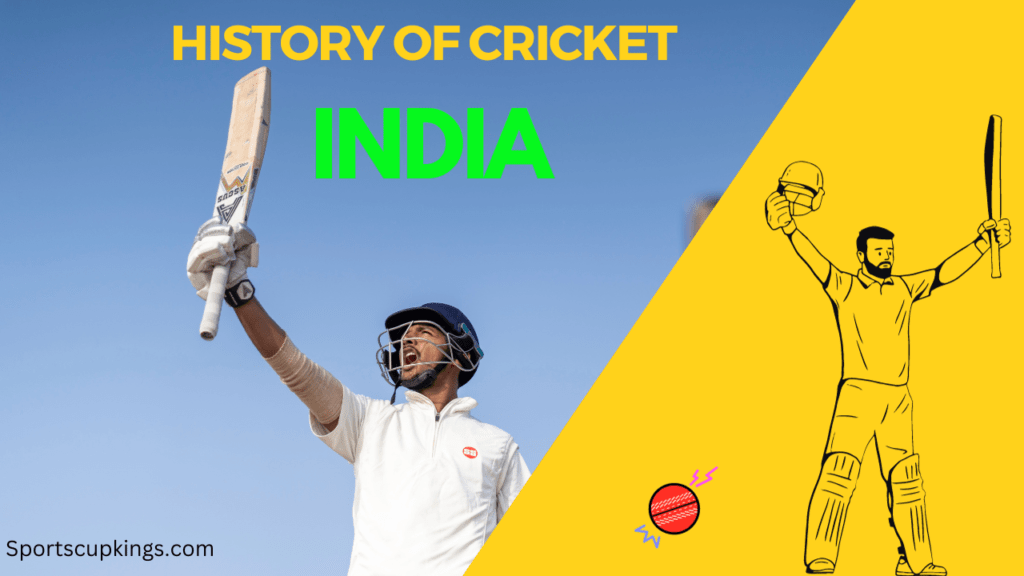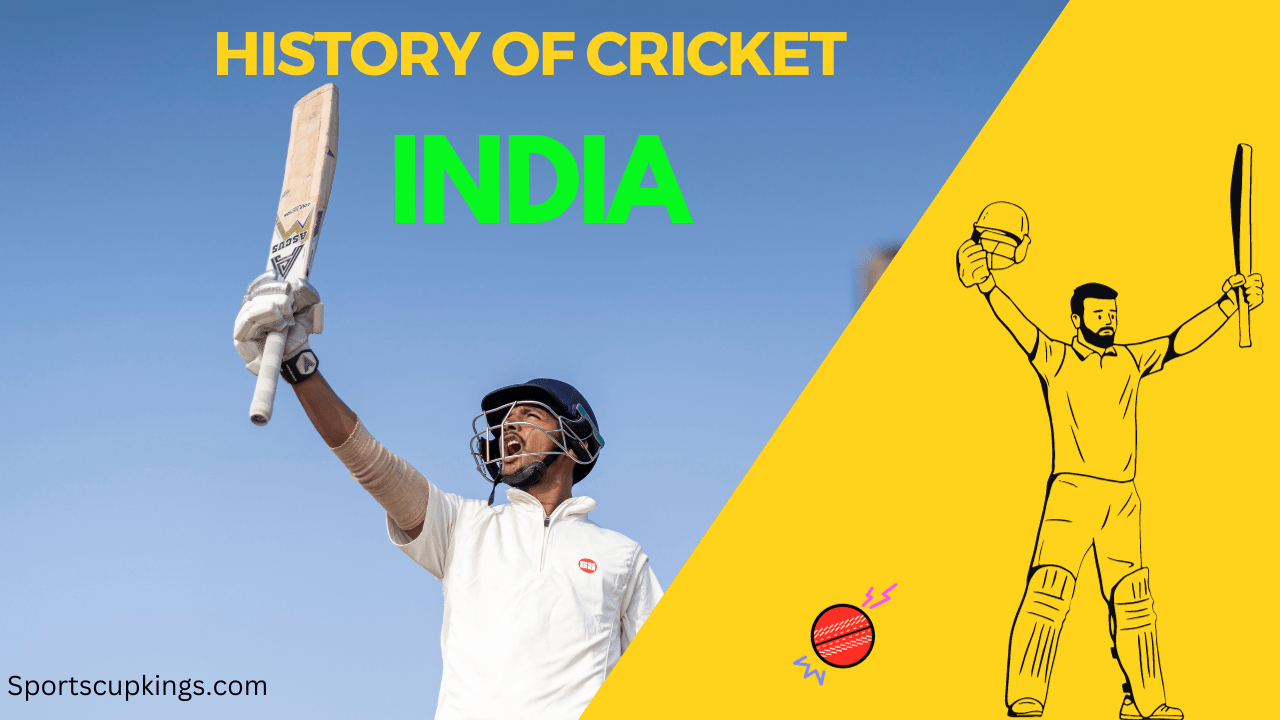Cricket was introduced to the Indian subcontinent by British sailors in the 18th century, and the first cricket club in India was established in Calcutta (now Kolkata) in 1792. The sport quickly gained popularity among the Indian elite, and by the late 19th century, it was one of the most popular sports in the country.
History of Cricket in India
The first Indian cricket team toured England in 1911, but it was not until 1932 that India became a Test-playing nation. India’s early years in Test cricket were difficult, and the team did not win its first Test match until 1952. However, India’s fortunes began to improve in the 1960s and 1970s, thanks to the emergence of a number of world-class players, such as Mansur Ali Khan Pataudi, Sunil Gavaskar, and Kapil Dev.

In the 1980s and 1990s, India became one of the leading cricket teams in the world. The team won its first World Cup title in 1983, and it reached the final of the World Cup on two further occasions in the 1990s. India also had a number of memorable Test series victories during this period, including a series win in England in 1986 and a series win in Australia in 1991.
The early 2000s were a golden era for Indian cricket. The team, led by Sourav Ganguly and Sachin Tendulkar, won numerous Test series and tournament victories. India won the 2002 NatWest Series final against England at Lord’s, which is considered to be one of the greatest comebacks in ODI cricket history. India also reached the final of the 2003 World Cup, but lost to Australia.
In 2007, India won the inaugural T20 World Cup, defeating Pakistan in the final. This victory sparked a revolution in Indian cricket, and the Indian Premier League (IPL), which was launched in 2008, quickly became the most popular cricket tournament in the world.
The IPL has helped to develop a new generation of Indian cricketers, and the team has continued to be one of the most successful in the world in recent years. India won the 2011 World Cup, defeating Sri Lanka in the final, and it reached the final of the 2015 World Cup, losing to Australia. India has also won the T20 World Cup twice more, in 2014 and 2023.
Cricket is now more than just a sport in India. It is a cultural phenomenon that unites people from all walks of life. Cricketers are worshipped as gods in India, and the Indian cricket team is one of the most popular sports teams in the world.
Key milestones in the history of cricket in India
- 1792: The first cricket club in India is established in Calcutta (now Kolkata).
- 1911: The first Indian cricket team tours England.
- 1932: India becomes a Test-playing nation.
- 1952: India wins its first Test match.
- 1964: India wins its first Test series against England.
- 1971: India wins its first Test series against Australia.
- 1983: India wins the World Cup for the first time.
- 1986: India wins a Test series in England for the first time.
- 1991: India wins a Test series in Australia for the first time.
- 1996: India reaches the final of the World Cup, but loses to Sri Lanka.
- 2002: India wins the NatWest Series final against England at Lord’s.
- 2003: India reaches the final of the World Cup, but loses to Australia.
- 2007: India wins the inaugural T20 World Cup.
- 2008: The Indian Premier League (IPL) is launched.
- 2011: India wins the World Cup for the second time.
- 2014: India wins the T20 World Cup for the second time.
- 2015: India reaches the final of the World Cup, but loses to Australia.
- 2023: India wins the T20 World Cup for the third time.
Legendary Moments
The history of cricket in India is studded with legendary moments that have become an indelible part of the nation’s sporting heritage.
1983 World Cup Triumph
One of the most iconic moments was India’s unexpected victory in the 1983 Cricket World Cup. Kapil Dev’s ‘Devil’s Brigade’ captured the imagination of the entire nation.
Sachin Tendulkar’s Records
Sachin Tendulkar, the ‘God of Cricket,’ is a name etched in cricketing history. His numerous records, including being the highest run-scorer in international cricket, made him a global phenomenon.
Virat Kohli’s Captaincy
Virat Kohli’s inspiring leadership and exceptional batting prowess have propelled Indian cricket to new heights. His captaincy era saw India dominating Test cricket rankings.
Dhoni’s Captain Cool
Mahendra Singh Dhoni, affectionately known as ‘Captain Cool,’ led India to multiple international victories, including the 2007 ICC World Twenty20 and the 2011 ICC Cricket World Cup.
Cricket and Indian Society
Cricket has transcended the boundaries of a sport in India; it has become a part of the nation’s identity.
Cricket and National Unity
Cricket has the unique ability to unite a diverse nation like India. When the Indian cricket team plays, it unites the country, transcending linguistic, cultural, and regional differences.
Economic Impact
The Indian Premier League (IPL), one of the most-watched cricket leagues globally, has created economic opportunities and made cricket a lucrative career choice.
Cricket’s Cultural Influence
From Bollywood celebrities to political leaders, cricket has left an indelible mark on Indian culture. The sport influences fashion, music, and entertainment in the country.
FAQs
Q: When did cricket first come to India?
A: Cricket was introduced to India in the early 1700s by the British East India Company.
Q: Who is considered the ‘God of Cricket’?
A: Sachin Tendulkar is often referred to as the ‘God of Cricket’ due to his exceptional cricketing records.
Q: How did cricket contribute to Indian unity?
A: Cricket has the unique ability to unite a diverse nation like India, transcending linguistic, cultural, and regional differences.
Q: What is the economic impact of cricket in India?
A: The Indian Premier League (IPL) has created economic opportunities and made cricket a lucrative career choice in India.
Q: Who is the most successful Indian cricket captain?
A: Mahendra Singh Dhoni, known as ‘Captain Cool,’ is considered one of the most successful Indian cricket captains.
Q: When did India win its first Cricket World Cup?
A: India won its first Cricket World Cup in 1983, captained by Kapil Dev.
Conclusion
The history of cricket in India is a story of passion, perseverance, and unity. From its humble beginnings under British colonialism to becoming a global cricketing powerhouse, cricket has enriched the lives of millions of Indians. It’s not just a sport; it’s a way of life. As India continues to shine on the international cricket stage, the love affair between the nation and the sport remains stronger than ever.
Impact of cricket on Indian society
Cricket has had a profound impact on Indian society. It has helped to unite people from all walks of life, and it has inspired millions of Indians to achieve their dreams. Cricket has also played a role in promoting social change in India.

